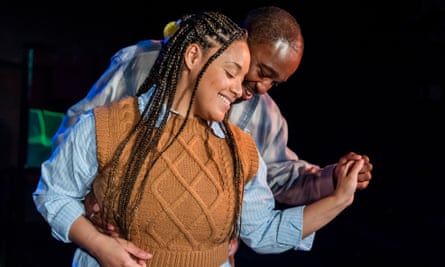Grief does not come with an instruction manual. Naomi Denny’s tender three-hander navigates the rocky aftermath of death, in the tricky period where you don’t know what you’re meant to feel, and no one around you knows what to say. Handled with care by director Lucy Jane Atkinson, All the Happy Things is a quiet, sweet and simply told story of two sisters, one learning how to keep going without the other.
Playwright Denny also leads the narrative as Sienna, a high achiever who would disapprove of being described primarily in relation to her dead sister, Emily (LJ Johnson, playful and loose-limbed), though the two are inseparable in this story. A year on from Emily’s accident, Sienna is still seeing her everywhere. So all-consuming is her goofy, sometimes grumpy sister’s presence that Emily repeatedly speaks over others and distracts Sienna, Ghosts-style, from her job and relationship.
Denny and Johnson have an easy rapport, one moment bickering and sniping at each other, the next dancing in unison as they always used to do. Dejon Mullings is the final part of our trio, playing Sienna’s boyfriend Sam, a model partner in the face of loss. He is gentle when Sienna snaps at him, soft when she needs to be held, and understanding when she pushes away his efforts to help her wade through the grief that she insists isn’t overwhelming her, even as her movements become skittish and strained.

The play’s reflections on grief are hardly new, but the familiar conversations are performed with humour and affection. Warmth pushes through, even as Eamonn O’Dwyer’s sound design jolts us back to the reality of loss. Where the script sings is in the small detail of the sisters’ relationship. The moment we realise the limitations of Emily’s visitations is painful; she can’t remind Sienna of her favourite song because if Sienna doesn’t know it, this figment of Emily doesn’t either.
Denny throws Sienna little life buoys in the form of new knowledge about her sister. It is a unique joy to learn something fresh about someone who has died: from an object they’ve hidden; a card they’ve written; something silly they used to do that you’re hearing about for the first time. These new memories are finite. By weaving them throughout Sienna and Emily’s story, Denny illuminates just how precious they are.
